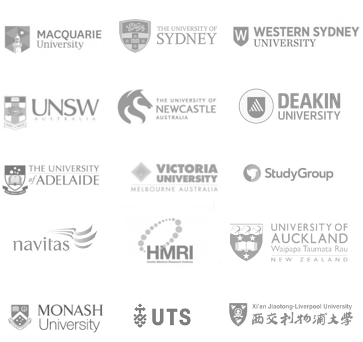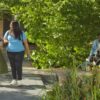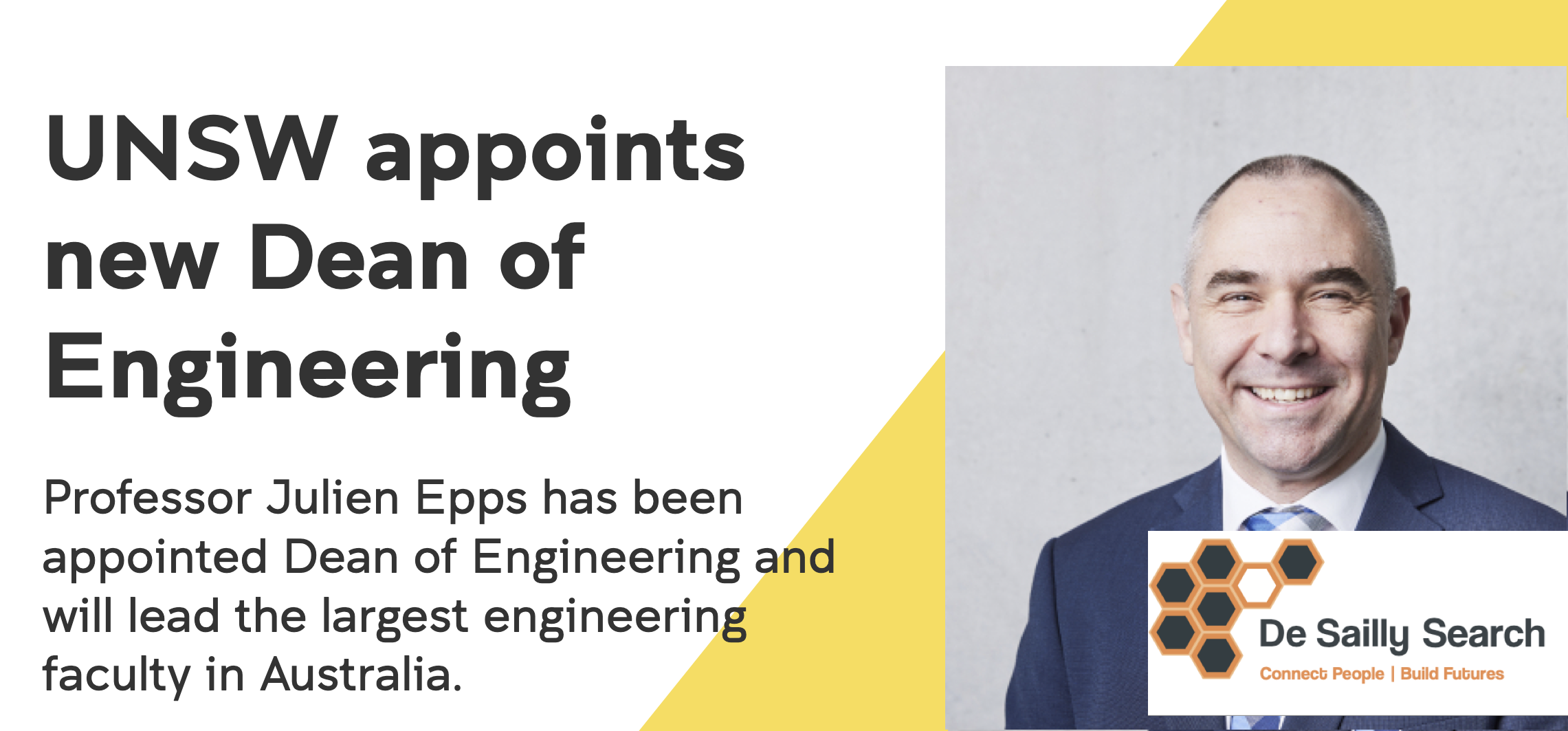
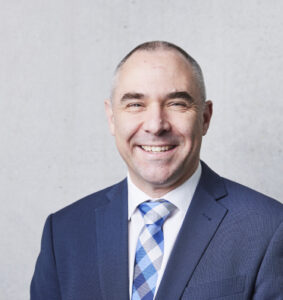 Congratulations to Professor Julien Epps who has been confirmed as the new incoming Dean of UNSW Engineering following a global search.
Congratulations to Professor Julien Epps who has been confirmed as the new incoming Dean of UNSW Engineering following a global search.
In the University’s announcement, UNSW Sydney Vice-Chancellor and President Professor Attila Brungs highlighted Julien’s strong track record as a leader in research translation. While serving as Head of UNSW’s School of Electrical Engineering and Telecommunications — which is the largest and highest ranked school of its kind in Australia — Julien drove the introduction of the world’s first Bachelor of Quantum Engineering program, and has served as Co-Director of the NSW Smart Sensing Network, bringing together together industry, government and nine universities to co-create multi-university, multi-disciplinary smart sensing solutions to address pressing societal challenges.
Julien is a proud UNSW alumnus, boasting both a Bachelor’s and PhD in Electrical Engineering from the university. Securing his doctorate in 2001, he quickly rose to prominence, taking on significant roles including Senior Research Engineer at Motorola Labs and Senior Researcher and Project Leader at National ICT Australia. By 2007, his expertise led him back to UNSW, where he took up a position as a Senior Lecturer.
About UNSW Engineering
As the #1 engineering Faculty in Australia, and ranked in the top 25 globally, UNSW Engineering has been a major hub for engineering studies and research for more than 70 years. The Faculty offers the most comprehensive range of engineering degrees in the country, and its internationally renowned research programs have seen it become a world leader in quantum computing research.
UNSW Engineering comprises eight schools, as well as the Australian Graduate School of Engineering, covering 165+ specialisations. The Faculty’s academic portfolio covers biomedical engineering, chemical engineering, civil and environmental engineering, computer science and engineering, electrical engineering and telecommunications, mechanical and manufacturing engineering, minerals and energy resources engineering, photovoltaic and renewable energy engineering. UNSW Engineering fosters the highest number of female students of any engineering Faculty in Australia, while its graduates receive the highest starting salaries of any member universities of the Group of Eight Australia. With over 15,000 students and 900 permanent staff and over 1200 higher degree research students, the Faculty is central to UNSW’s identity as an institution, transforming lives through excellence in research, outstanding education, and a commitment to advancing a just society.
Harnessing the power of interdisciplinary thought and global leadership, the Faculty is also a host and participant in a number of world class interdisciplinary research centres and institutes focused on renewable energy, water research and environmental technologies, infrastructure, integrated transport, space engineering, defence capabilities, nanomedicine, advanced solid and liquid based electronics and optics, health engineering, hydrogen engineering, cybersecurity, artificial intelligence, digital grids, materials and manufacturing futures, future food systems, low carbon living, greenhouse gas technologies, advanced photovoltaics, micro and nanofabrication, macromolecular design, interactive cinema and carbon engineering and materials.
Located in Sydney, a global city recognised for its strengths in key industry sectors financial and professional services, information technology, health, education and research, the Faculty has strong connections into the surrounding ecosystem, with opportunities for more engagement in local digital and information communication technology, defence, environment, biomedicine and entertainment industries. The harbour city is where hundreds of multinational companies choose to run their Asia Pacific operations, including Amazon, Google and Microsoft. A home of start-ups and breakthrough innovations, Sydney launched Google Maps, ground-breaking quantum hacks, and the Atlassian Corporation, an Australian software company founded by two UNSW graduates, making them two of the nation’s most wealthy individuals.
UNSW Engineering: Help build the world you want to live in. 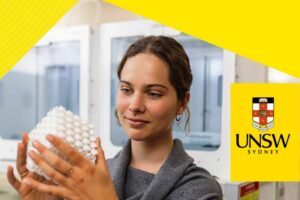
UNSW Engineering has more than 300,000 alumni around the world in over 150 countries, and continues to have a very international student cohort. The Faculty delivers high quality education, at scale, through creating new and effective education methods including new technologies, with further room to adapt the education to equip engineering graduates to meet the challenges of the 21st century.
The Faculty’s pathway to becoming a world top 25 engineering school involved strategic partnering with industry, and an increase in the number and level of staff and students leading industry research. UNSW uses the term “industry” to include all impact partners, from early stage start-ups through to the world’s largest corporations, both Australian and international, as well as government at all levels, and not-for-profit agencies. Partners and projects range in size and duration, and staff and students are encouraged to commercialise ideas and establish new companies. Over the next five years, across the university and beyond, opportunities for new and continued cross-disciplinary collaborations abound. UNSW areas of current research strength include: biomedical sciences; water, climate, environment and sustainability; next generation materials and technologies; social policy, government and health policy; ICT, robotics and devices; law, business and economics; fundamental and enabling sciences; contemporary humanities and creative arts; and defence and security.
About the role
The Dean of Engineering at UNSW leads the largest engineering faculty in Australia. The Dean serves as a key representative of the university and Faculty community, connecting and articulating its social and economic contributions to local, state, national and global stakeholders, and setting a strategic agenda to build the Faculty as being both innovative and effective in response to the needs of society and industry.
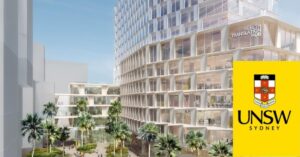 The Dean of UNSW Engineering commences at a time of new collaboration opportunities with developments at UNSW, including The Defence Trailblazer for Concept to Sovereign Capability and the Health Precincts. Health precincts centre on research and innovation activity, partner investment, place-making, network sharing and specialisation, deliver outcomes beyond health district boundaries, including economic development opportunities, as well as health, educational and social benefits. These developments are just two examples of the University’s Australia-wide collaborative partnerships with government, industry and academia.
The Dean of UNSW Engineering commences at a time of new collaboration opportunities with developments at UNSW, including The Defence Trailblazer for Concept to Sovereign Capability and the Health Precincts. Health precincts centre on research and innovation activity, partner investment, place-making, network sharing and specialisation, deliver outcomes beyond health district boundaries, including economic development opportunities, as well as health, educational and social benefits. These developments are just two examples of the University’s Australia-wide collaborative partnerships with government, industry and academia.

